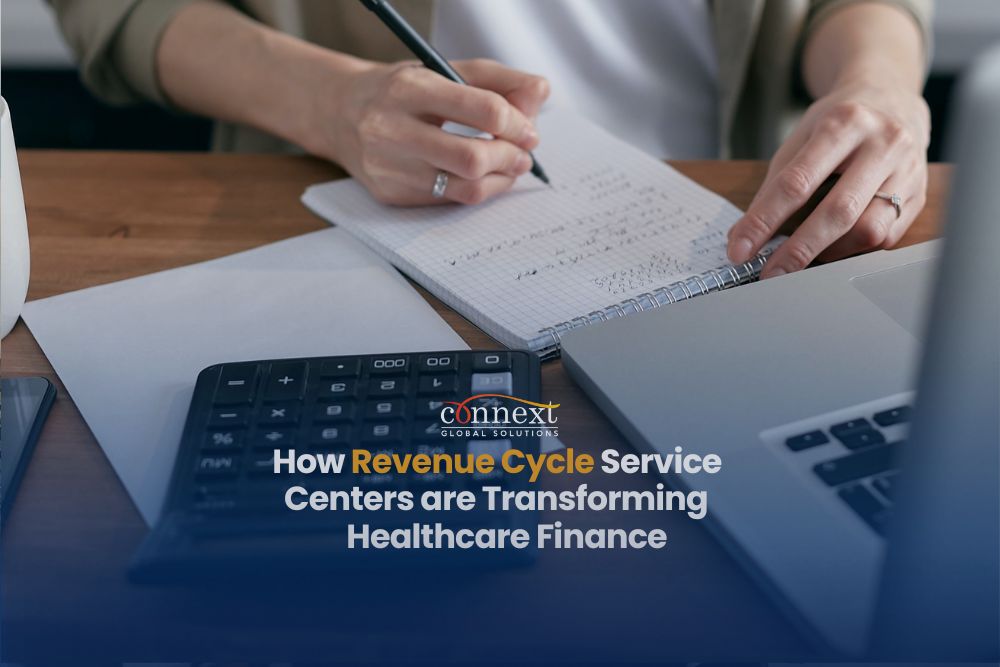The healthcare industry is constantly evolving, and one area that has seen significant change in recent years is finance. As healthcare costs continue to rise, hospitals are facing increasing pressure to reduce expenses while maintaining high standards of patient care. One way that hospitals are achieving this balance is through the use of revenue cycle service centers. These centers provide financial stability, operational efficiency, and sustainable models for healthcare institutions.

Photo by Mikhail Nilov via Pexels
In this article, we will explore revenue cycle service centers and how outsourcing revenue cycle jobs to specialized service providers can be a game-changer. See how hospitals can navigate the intricacies of revenue cycle management while simultaneously reaping a plethora of benefits by relying on the expertise of skilled finance professionals.
Understanding revenue cycle service centers
Before we delve into the transformative power of revenue cycle service centers, let’s gain a clear understanding of what they entail. A revenue cycle service center is a specialized entity dedicated to managing the intricate financial processes within healthcare facilities. Their scope encompasses billing, claims processing, and revenue optimization, all crucial elements in healthcare finance.
A hospital’s financial health relies on having efficient revenue cycle management and revenue cycle service centers provide help in that aspect.
The financial challenges faced by healthcare facilities
Healthcare facilities often find themselves grappling with a multitude of financial challenges:
1. Fluctuating reimbursement rates
Navigating the maze of constantly changing reimbursement rates can be a daunting task.
2. Billing complexities
Complex billing processes add another layer of difficulty, making it challenging to keep financial operations running smoothly.
3. Pressure to cut costs
Healthcare facilities are continually under pressure to reduce costs while maintaining the highest standards of patient care.
How revenue cycle service centers address financial challenges
Revenue cycle service centers step in as a lifeline for healthcare facilities. They offer a range of solutions to help healthcare facilities navigate the complex financial challenges of the healthcare industry. By leveraging their expertise and technology, these service centers can improve financial performance, increase efficiency, and reduce costs for healthcare providers.
Here are some ways in which revenue cycle service centers address financial challenges:
1. Improving revenue cycle management (RCM)
In an era where sustainable financial practices are a must, revenue cycle service centers are proving to be invaluable allies. With these service providers at the helm, they can offer comprehensive RCM solutions that streamline billing and collections processes, reduce denials and rejections, and optimize reimbursement rates. This can translate into faster payments, reduced bad debt, and increased revenue.
2. Enhancing patient experience
Efficient revenue management directly affects the quality of patient care. Outsourcing to revenue cycle services allows hospitals to redirect resources away from administrative tasks and toward patient-centric initiatives, enhancing the overall healthcare experience.
Revenue cycle service centers implement technology-driven solutions that enhance patient satisfaction by simplifying the payment process and providing a more transparent billing experience. This can lead to increased patient loyalty and higher patient retention rates.
3. Increasing operational efficiency
Revenue cycle service centers use advanced analytics and automation tools to identify operational inefficiencies and implement process improvements that reduce costs and increase efficiency. This can help healthcare providers save time and resources while improving overall financial performance. Additionally, with reduced operational loads, healthcare facilities gain the potential to expand their services.
4. Providing regulatory compliance support
The healthcare industry is no stranger to regulatory changes. Revenue cycle service centers help their clients stay up-to-date with regulatory changes and provide guidance on compliance issues related to billing and collections. This can help healthcare providers avoid fines or penalties and maintain compliance with industry regulations.
5. Alleviating budget constraints for innovation
Investing in advanced technology and innovation is vital for the future of healthcare. However, budget constraints often hinder such investments. Outsourcing revenue cycle management can free up financial resources, fostering innovation within healthcare facilities.
Factors to consider when choosing a revenue cycle service center for outsourcing
1. Expertise and experience
Industry-specific knowledge is paramount for effective revenue cycle management. Outsourcing partners bring a wealth of experience, understanding the nuances of healthcare finance and billing intricacies.
2. Technological capabilities
In today’s healthcare landscape, technology plays a vital role in revenue cycle management. Reliable outsourcing partners leverage advanced tools and systems, ensuring efficient and accurate processes.
3. Data security and compliance
Patient financial data is highly sensitive. Outsourcing partners must adhere to strict data security standards and comply with healthcare regulations to safeguard patient privacy.
4. Customization and alignment with hospital needs
Each hospital has unique requirements. Successful outsourcing partnerships involve tailoring services to align with specific needs, ensuring collaborative goal achievement.
Steps for a smooth transition to outsourcing tasks to a revenue cycle service center
1. Assessing current internal processes
Hospitals need to identify pain points and areas for improvement within their existing revenue cycle management before embarking on outsourcing.
2. Communication and stakeholder involvement
Engaging relevant departments in the decision-making process fosters alignment and ensures that expectations are met during the transition.
3. Training and knowledge transfer
Seamless knowledge transfer ensures that the expertise and institutional knowledge are shared with the outsourcing partner. Ongoing training ensures a cohesive collaboration.
Conclusion
In today’s dynamic healthcare landscape, where financial challenges loom large and the demand for excellence in patient care remains unwavering, revenue cycle service centers have proven themselves to be indispensable allies for healthcare institutions. These specialized entities are the cornerstone of financial stability, operational efficiency, and sustainability within the healthcare finance realm. By addressing the complex issues of fluctuating reimbursement rates, billing intricacies, and the perpetual need to trim costs, revenue cycle service centers are transforming the way hospitals manage their finances. They are not merely providers but catalysts for change, offering innovative solutions that streamline revenue cycle management, elevate the patient experience, enhance operational efficiency, ensure regulatory compliance, and pave the way for much-needed innovations in healthcare.
Discover the broader trends influencing healthcare finance. Read our blog post trends shaping the financial services industry to see how developments like revenue cycle service centers are part of a larger shift in the financial landscape.
Connext Global Solutions provides Healthcare Outsourcing for healthcare organizations. If you need help with your revenue cycle management, outsource RCM and other Healthcare services to Connext today.









